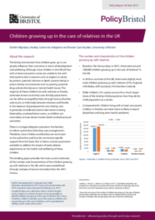The family environment that children grow up in can greatly influence their outcomes in terms of development and wellbeing. Although most children in the UK still live with at least one parent, some are unable to live with their parents due to reasons such as neglect or abuse by parents, parental sickness or death, parents being in prison, family circumstances such as poverty, parental drug and alcohol abuse or mental health issues. The majority of these children live with relatives or friends, otherwise known as kinship care. Kinship placements can be either arranged formally through local authorities and courts, or informally between relatives and friends. In the absence of good parental care, kinship care is generally considered a better alternative to being fostered by unrelated foster carers, as children are more likely to have better mental health and behavioural outcomes.
There is no legal obligation placed on the families to inform authorities of kinship care arrangements. Therefore, most children and families are not known to the authorities and thus do not receive specific support from the State. Nor is there a statutory provision available to address the impact of early adverse experiences on the health and wellbeing of these children.
This policy brief provides the most current estimates of the number and characteristics of the children growing up with relatives in the UK, which were established through analyses of secure microdata from the 2011 Census, highlighting analysis and policy implications of those findings.

